Answered step by step
Verified Expert Solution
Question
1 Approved Answer
If you consider this small Polish-US Joint venture as a kind of large multicultural team, would you say it is achieving its group-level social process
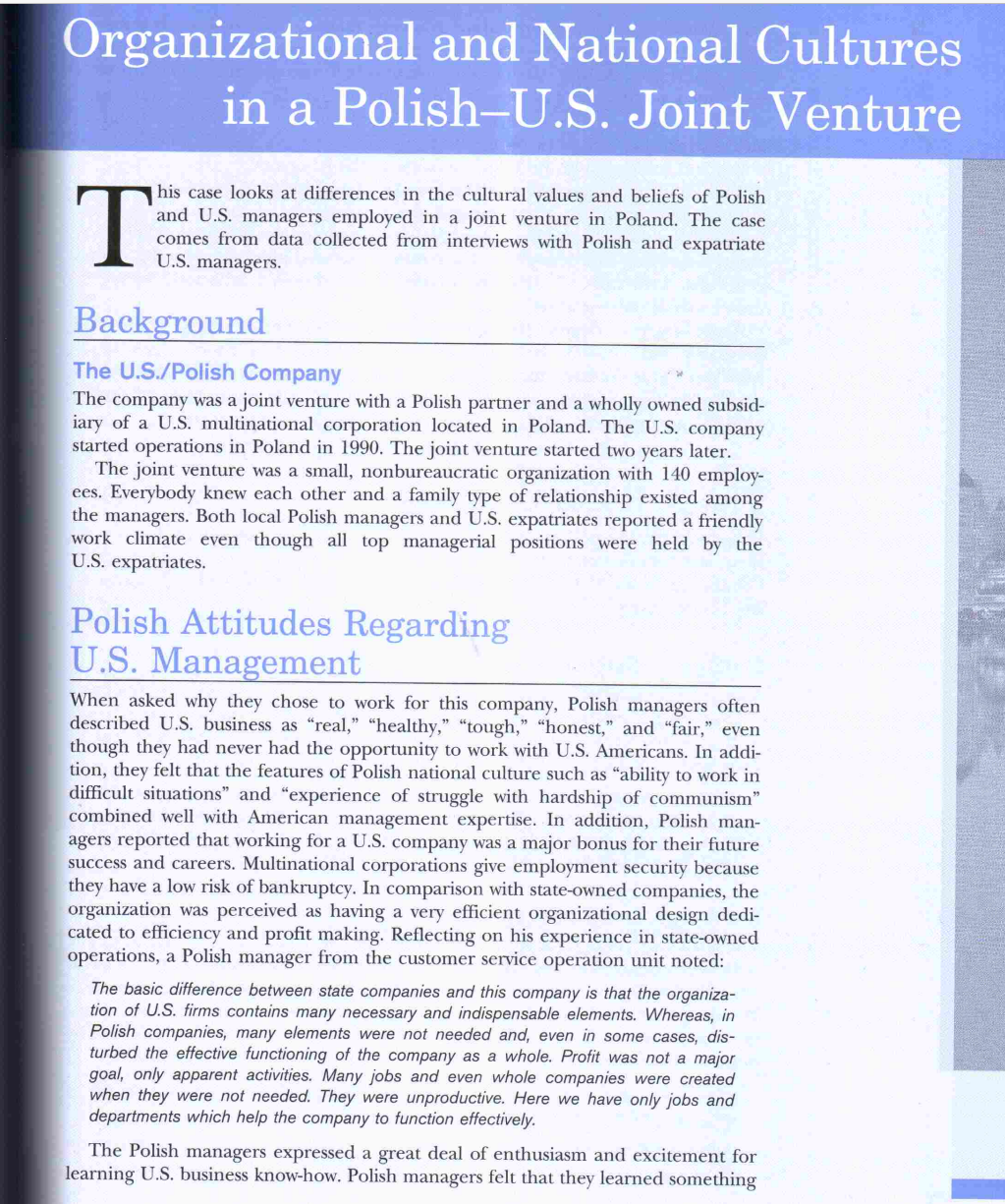
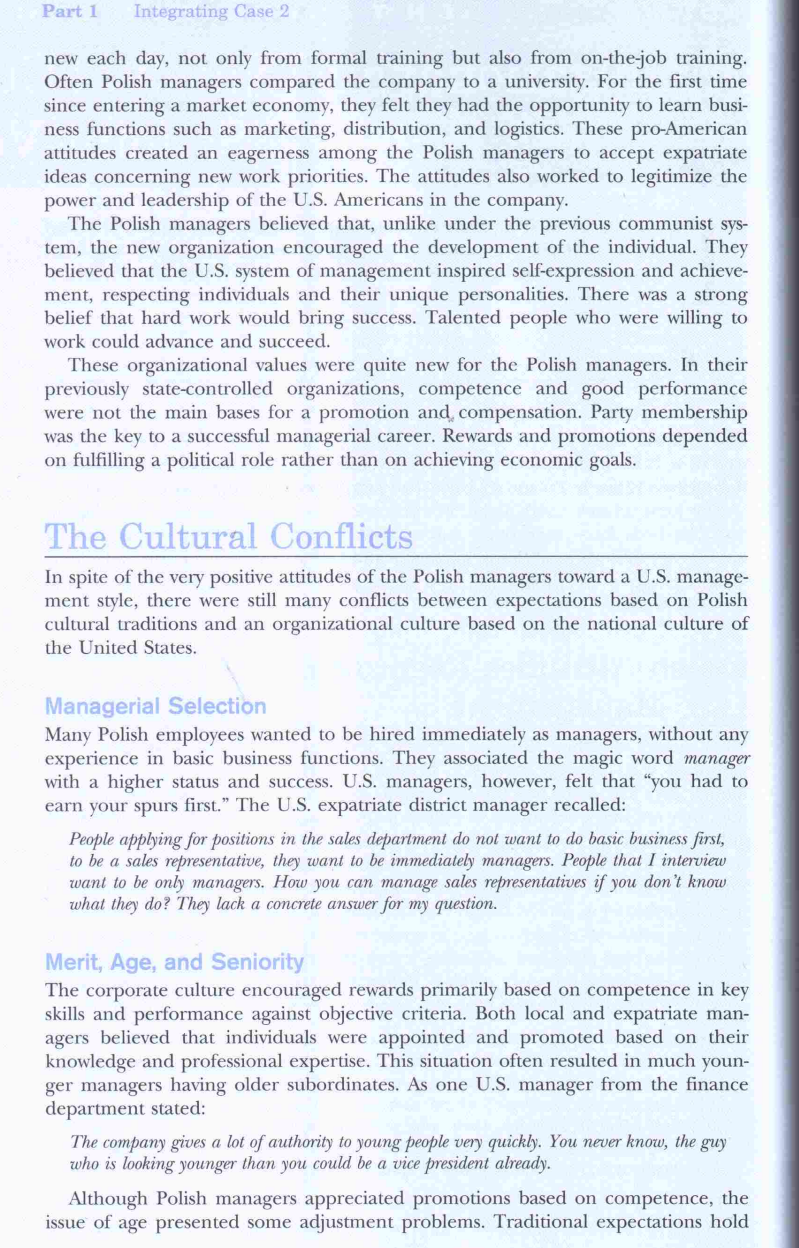
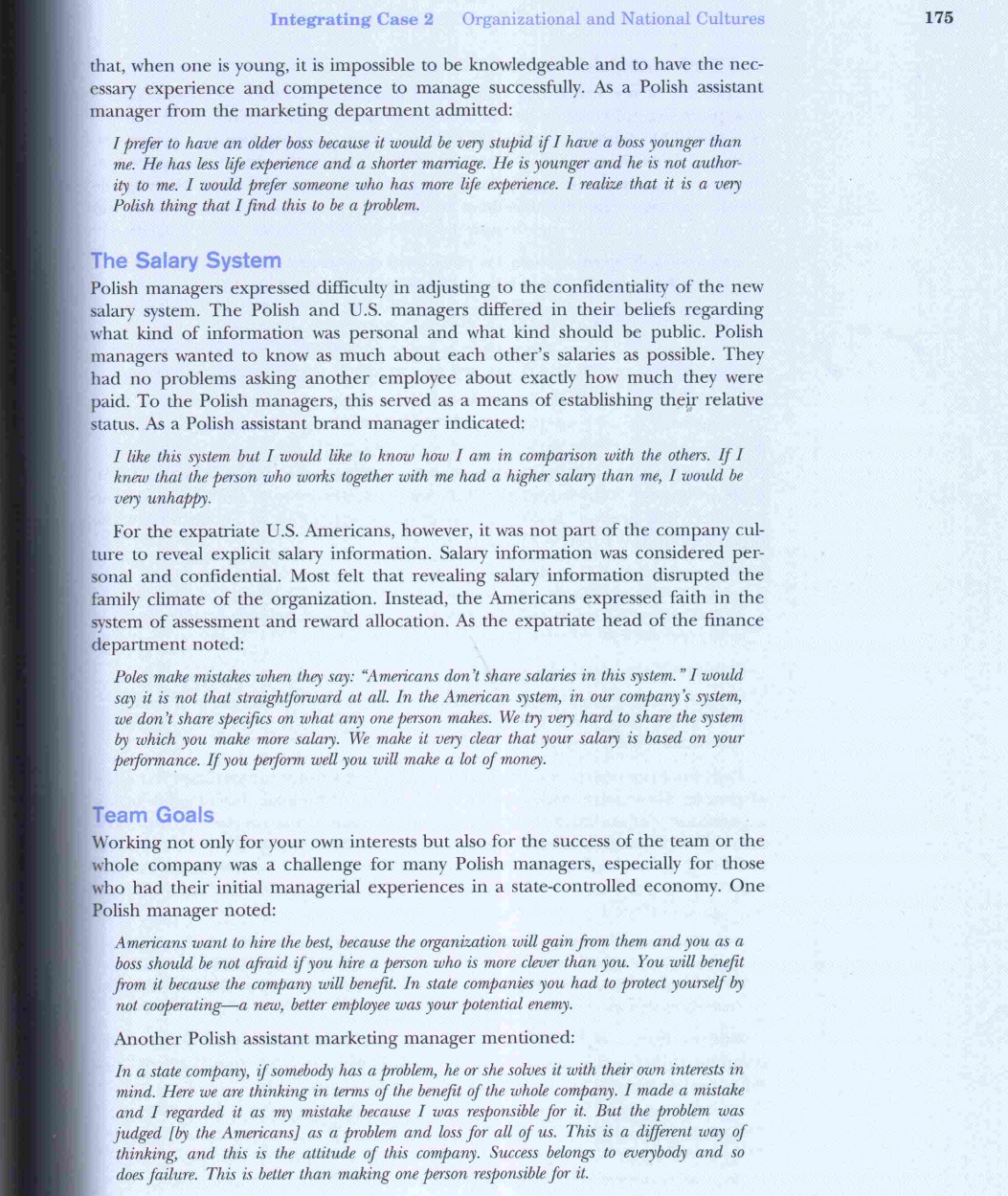
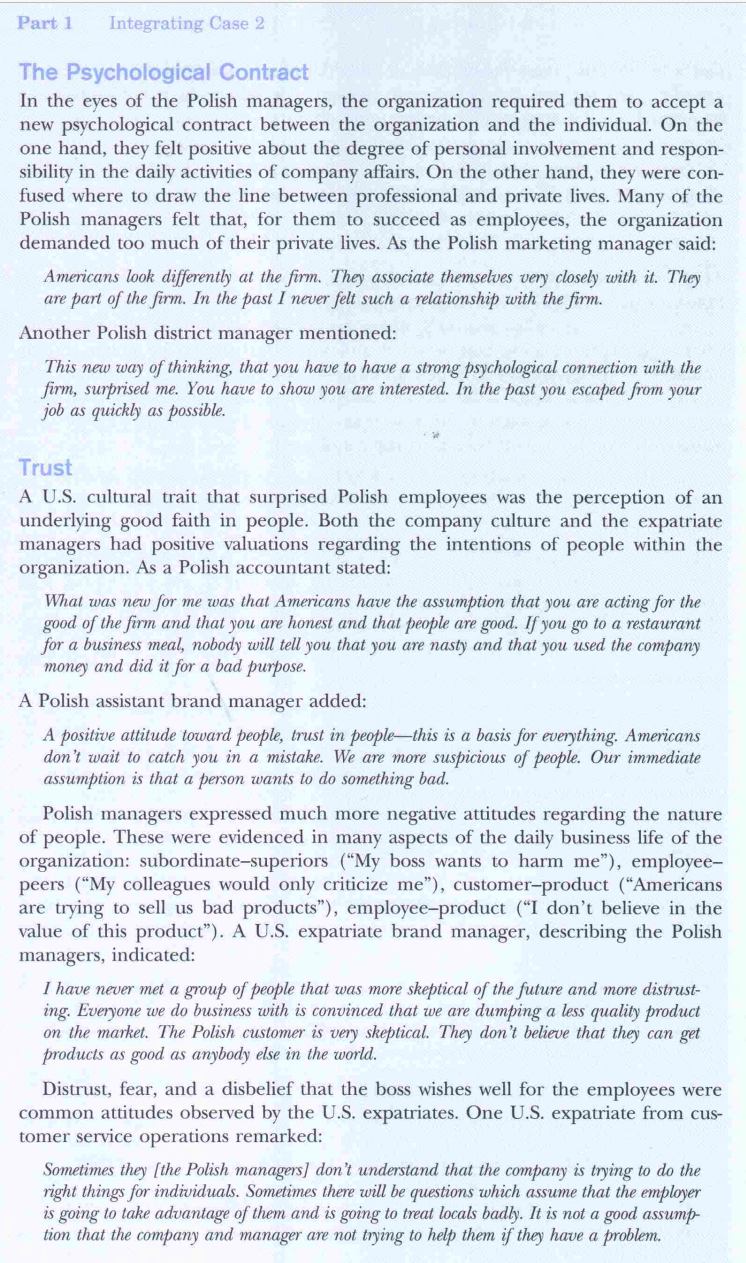
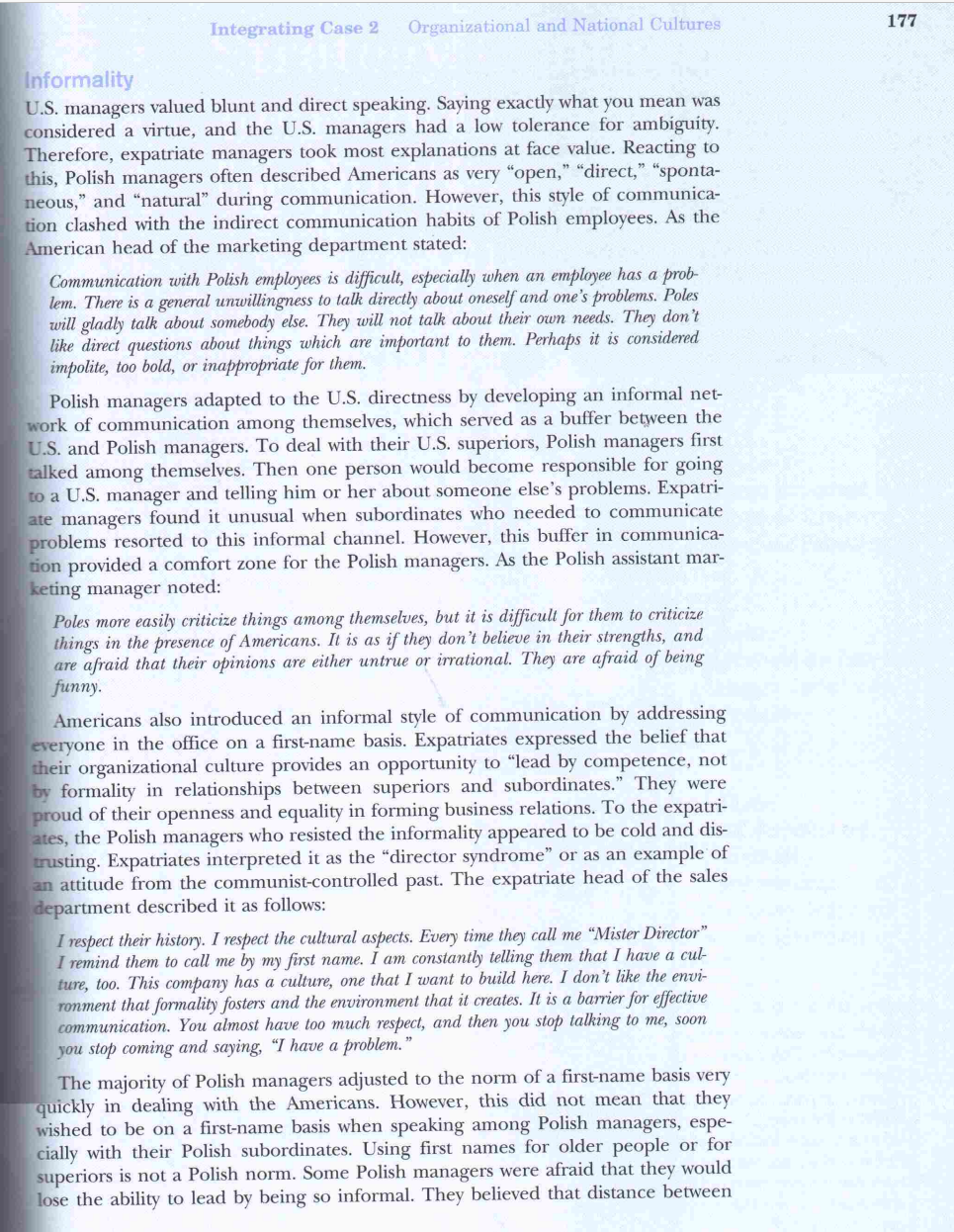
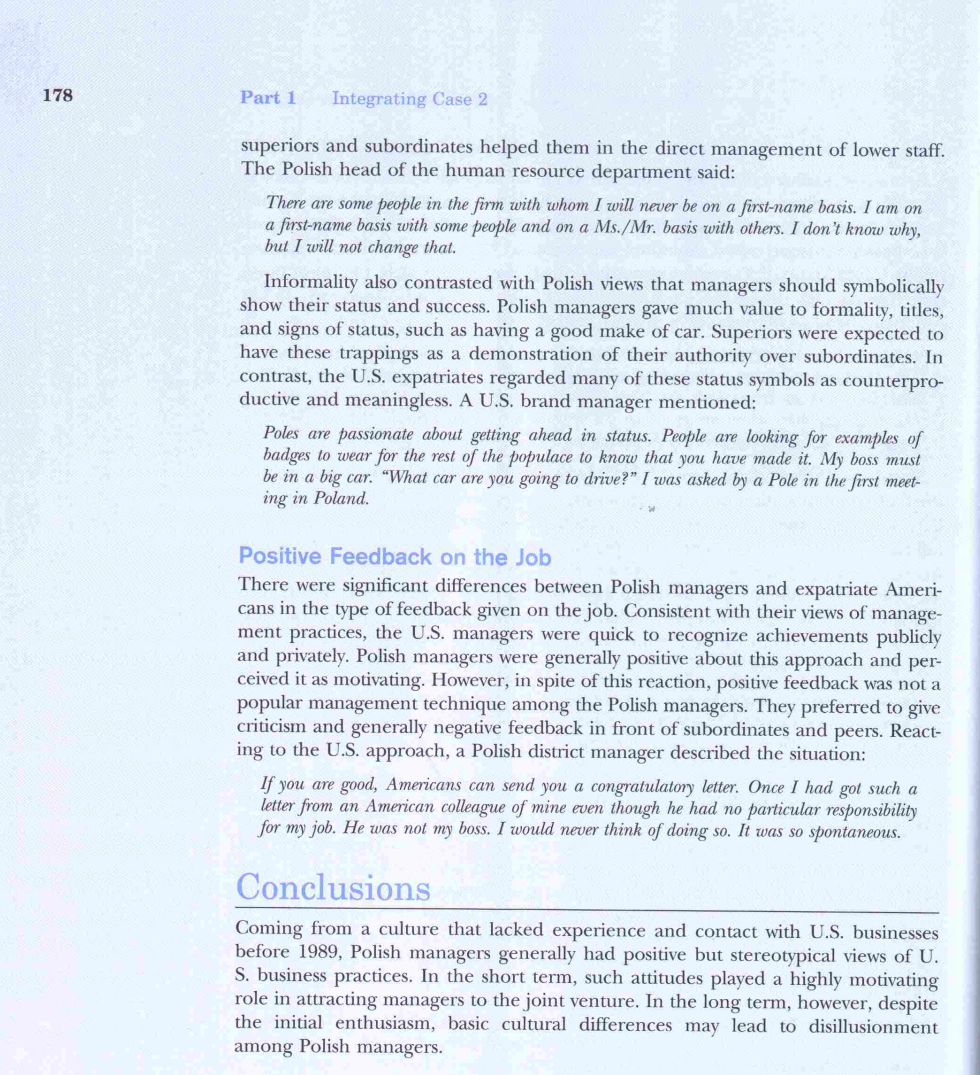
If you consider this small Polish-US Joint venture as a kind of large multicultural team, would you say it is achieving its group-level social process outcomes? Why/why not?
Organizational and National Cultures in a Polish-U.S. Joint Venture his case looks at differences in the cultural values and beliefs of Polish and U.S. managers employed in a joint venture in Poland. The case comes from data collected from interviews with Polish and expatriate U.S. managers. Background The U.S./Polish Company The company was a joint venture with a Polish partner and a wholly owned subsidiary of a U.S. multinational corporation located in Poland. The U.S. company started operations in Poland in 1990. The joint venture started two years later. The joint venture was a small, nonbureaucratic organization with 140 employees. Everybody knew each other and a family type of relationship existed among the managers. Both local Polish managers and U.S. expatriates reported a friendly work climate even though all top managerial positions were held by the U.S. expatriates. Polish Attitudes Regarding U.S. Management When asked why they chose to work for this company, Polish managers often described U.S. business as "real," "healthy," "tough," "honest," and "fair," even though they had never had the opportunity to work with U.S. Americans. In addition, they felt that the features of Polish national culture such as "ability to work in difficult situations" and "experience of struggle with hardship of communism" combined well with American management expertise. In addition, Polish managers reported that working for a U.S. company was a major bonus for their future success and careers. Multinational corporations give employment security because they have a low risk of bankruptcy. In comparison with state-owned companies, the organization was perceived as having a very efficient organizational design dedicated to efficiency and profit making. Reflecting on his experience in state-owned operations, a Polish manager from the customer service operation unit noted: The basic difference between state companies and this company is that the organization of U.S. firms contains many necessary and indispensable elements. Whereas, in Polish companies, many elements were not needed and, even in some cases, disturbed the effective functioning of the company as a whole. Profit was not a major goal, only apparent activities. Many jobs and even whole companies were created when they were not needed. They were unproductive. Here we have only jobs and departments which help the company to function effectively. The Polish managers expressed a great deal of enthusiasm and excitement for learning U.S. business know-how. Polish managers felt that they learned something new each day, not only from formal training but also from on-the-job training. Often Polish managers compared the company to a university. For the first time since entering a market economy, they felt they had the opportunity to learn business functions such as marketing, distribution, and logistics. These pro-American attitudes created an eagerness among the Polish managers to accept expatriate ideas concerning new work priorities. The attitudes also worked to legitimize the power and leadership of the U.S. Americans in the company. The Polish managers believed that, unlike under the previous communist system, the new organization encouraged the development of the individual. They believed that the U.S. system of management inspired self-expression and achievement, respecting individuals and their unique personalities. There was a strong belief that hard work would bring success. Talented people who were willing to work could advance and succeed. These organizational values were quite new for the Polish managers. In their previously state-controlled organizations, competence and good performance were not the main bases for a promotion and compensation. Party membership was the key to a successful managerial career. Rewards and promotions depended on fulfilling a political role rather than on achieving economic goals. The Cultural Conflicts In spite of the very positive attitudes of the Polish managers toward a U.S. management style, there were still many conflicts between expectations based on Polish cultural traditions and an organizational culture based on the national culture of the United States. Managerial Selection Many Polish employees wanted to be hired immediately as managers, without any experience in basic business functions. They associated the magic word manager with a higher status and success. U.S. managers, however, felt that "you had to earn your spurs first." The U.S. expatriate district manager recalled: People applying for positions in the sales department do not want to do basic business first, to be a sales representative, they want to be immediately managers. People that I interview want to be only managers. How you can manage sales representatives if you don't know what they do? They lack a concrete answer for my question. Merit, Age, and Seniority The corporate culture encouraged rewards primarily based on competence in key skills and performance against objective criteria. Both local and expatriate managers believed that individuals were appointed and promoted based on their knowledge and professional expertise. This situation often resulted in much younger managers having older subordinates. As one U.S. manager from the finance department stated: The company gives a lot of authority to young people very quickly. You never know, the guy who is looking younger than you could be a vice president already. Although Polish managers appreciated promotions based on competence, the issue of age presented some adjustment problems. Traditional expectations hold that, when one is young, it is impossible to be knowledgeable and to have the necessary experience and competence to manage successfully. As a Polish assistant manager from the marketing department admitted: I prefer to have an older boss because it would be very stupid if I have a boss younger than me. He has less life experience and a shorter marriage. He is younger and he is not authority to me. I would prefer someone who has more life experience. I realize that it is a very Polish thing that I find this to be a problem. The Salary System Polish managers expressed difficulty in adjusting to the confidentiality of the new salary system. The Polish and U.S. managers differed in their beliefs regarding what kind of information was personal and what kind should be public. Polish managers wanted to know as much about each other's salaries as possible. They had no problems asking another employee about exactly how much they were paid. To the Polish managers, this served as a means of establishing their relative status. As a Polish assistant brand manager indicated: I like this system but I would like to know how I am in comparison with the others. If I knew that the person who works together with me had a higher salary than me, I would be very unhappy. For the expatriate U.S. Americans, however, it was not part of the company culture to reveal explicit salary information. Salary information was considered personal and confidential. Most felt that revealing salary information disrupted the family climate of the organization. Instead, the Americans expressed faith in the system of assessment and reward allocation. As the expatriate head of the finance department noted: Poles make mistakes when they say: "Americans don't share salaries in this system." I would say it is not that straightforward at all. In the American system, in our company's system, we don't share specifics on what any one person makes. We try very hard to share the system by which you make more salary. We make it very clear that your salary is based on your performance. If you perform well you will make a lot of money. Team Goals Working not only for your own interests but also for the success of the team or the whole company was a challenge for many Polish managers, especially for those who had their initial managerial experiences in a state-controlled economy. One Polish manager noted: Americans want to hire the best, because the organization will gain from them and you as a boss should be not afraid if you hire a person who is more clever than you. You will benefit from it because the company will benefit. In state companies you had to protect yourself by not cooperating-a new, better employee was your potential enemy. Another Polish assistant marketing manager mentioned: In a state company, if somebody has a problem, he or she solves it with their own interests in mind. Here we are thinking in terms of the benefit of the whole company. I made a mistake and I regarded it as my mistake because I was responsible for it. But the problem was judged [by the Americans] as a problem and loss for all of us. This is a different way of thinking, and this is the attitude of this company. Success belongs to everybody and so does failure. This is better than making one person responsible for it. The Psychological Contract In the eyes of the Polish managers, the organization required them to accept a new psychological contract between the organization and the individual. On the one hand, they felt positive about the degree of personal involvement and responsibility in the daily activities of company affairs. On the other hand, they were confused where to draw the line between professional and private lives. Many of the Polish managers felt that, for them to succeed as employees, the organization demanded too much of their private lives. As the Polish marketing manager said: Americans look differently at the firm. They associate themselves very closely with it. They are part of the firm. In the past I never felt such a relationship with the firm. Another Polish district manager mentioned: This new way of thinking, that you have to have a strong psychological connection with the firm, surprised me. You have to show you are interested. In the past you escaped from your job as quickly as possible. Trust A U.S. cultural trait that surprised Polish employees was the perception of an underlying good faith in people. Both the company culture and the expatriate managers had positive valuations regarding the intentions of people within the organization. As a Polish accountant stated: What was new for me was that Americans have the assumption that you are acting for the good of the firm and that you are honest and that people are good. If you go to a restaurant for a business meal, nobody will tell you that you are nasty and that you used the company money and did it for a bad purpose. A Polish assistant brand manager added: A positive attitude toward people, trust in people - this is a basis for everything. Americans don't wait to catch you in a mistake. We are more suspicious of people. Our immediate assumption is that a person wants to do something bad. Polish managers expressed much more negative attitudes regarding the nature of people. These were evidenced in many aspects of the daily business life of the organization: subordinate-superiors ("My boss wants to harm me"), employeepeers ("My colleagues would only criticize me"), customer-product ("Americans are trying to sell us bad products"), employee-product ("I don't believe in the value of this product"). A U.S. expatriate brand manager, describing the Polish managers, indicated: I have never met a group of people that was more skeptical of the future and more distrusting. Everyone we do business with is convinced that we are dumping a less quality product on the market. The Polish customer is very skeptical. They don't believe that they can get products as good as anybody else in the world. Distrust, fear, and a disbelief that the boss wishes well for the employees were common attitudes observed by the U.S. expatriates. One U.S. expatriate from customer service operations remarked: Sometimes they [the Polish managers] don't understand that the company is trying to do the right things for individuals. Sometimes there will be questions which assume that the employer is going to take advantage of them and is going to treat locals badly. It is not a good assumption that the company and manager are not trying to help them if they have a problem. Integrating Case 2 Organizational and National Cultures Informality U.S. managers valued blunt and direct speaking. Saying exactly what you mean was considered a virtue, and the U.S. managers had a low tolerance for ambiguity. Therefore, expatriate managers took most explanations at face value. Reacting to this, Polish managers often described Americans as very "open," "direct," "spontaneous," and "natural" during communication. However, this style of communication clashed with the indirect communication habits of Polish employees. As the American head of the marketing department stated: Communication with Polish employees is difficult, especially when an employee has a problem. There is a general unwillingness to talk directly about oneself and one's problems. Poles will gladly talk about somebody else. They will not talk about their own needs. They don't like direct questions about things which are important to them. Perhaps it is considered impolite, too bold, or inappropriate for them. Polish managers adapted to the U.S. directness by developing an informal network of communication among themselves, which served as a buffer between the U.S. and Polish managers. To deal with their U.S. superiors, Polish managers first talked among themselves. Then one person would become responsible for going to a U.S. manager and telling him or her about someone else's problems. Expatriate managers found it unusual when subordinates who needed to communicate problems resorted to this informal channel. However, this buffer in communication provided a comfort zone for the Polish managers. As the Polish assistant marketing manager noted: Poles more easily criticize things among themselves, but it is difficult for them to criticize things in the presence of Americans. It is as if they don't believe in their strengths, and are afraid that their opinions are either untrue or irrational. They are afraid of being funny. Americans also introduced an informal style of communication by addressing everyone in the office on a first-name basis. Expatriates expressed the belief that their organizational culture provides an opportunity to "lead by competence, not formality in relationships between superiors and subordinates." They were proud of their openness and equality in forming business relations. To the expatriates, the Polish managers who resisted the informality appeared to be cold and distrusting. Expatriates interpreted it as the "director syndrome" or as an example of an attitude from the communist-controlled past. The expatriate head of the sales department described it as follows: I respect their history. I respect the cultural aspects. Every time they call me "Mister Director" I remind them to call me by my first name. I am constantly telling them that I have a culture, too. This company has a culture, one that I want to build here. I don't like the environment that formality fosters and the environment that it creates. It is a barrier for effective communication. You almost have too much respect, and then you stop talking to me, soon you stop coming and saying, "I have a problem." The majority of Polish managers adjusted to the norm of a first-name basis very quickly in dealing with the Americans. However, this did not mean that they wished to be on a first-name basis when speaking among Polish managers, especially with their Polish subordinates. Using first names for older people or for superiors is not a Polish norm. Some Polish managers were afraid that they would lose the ability to lead by being so informal. They believed that distance between Part 1 Integrating Case 2 superiors and subordinates helped them in the direct management of lower staff. The Polish head of the human resource department said: There are some people in the firm with whom I will never be on a first-name basis. I am on a first-name basis with some people and on a Ms./Mr. basis with others. I don't know why, but I will not change that. Informality also contrasted with Polish views that managers should symbolically show their status and success. Polish managers gave much value to formality, titles, and signs of status, such as having a good make of car. Superiors were expected to have these trappings as a demonstration of their authority over subordinates. In contrast, the U.S. expatriates regarded many of these status symbols as counterproductive and meaningless. A U.S. brand manager mentioned: Poles are passionate about getting ahead in status. People are looking for examples of badges to wear for the rest of the populace to know that you have made it. My boss must be in a big car. "What car are you going to drive?" I was asked by a Pole in the first meeting in Poland. Positive Feedback on the Job There were significant differences between Polish managers and expatriate Americans in the type of feedback given on the job. Consistent with their views of management practices, the U.S. managers were quick to recognize achievements publicly and privately. Polish managers were generally positive about this approach and perceived it as motivating. However, in spite of this reaction, positive feedback was not a popular management technique among the Polish managers. They preferred to give criticism and generally negative feedback in front of subordinates and peers. Reacting to the U.S. approach, a Polish district manager described the situation: If you are good, Americans can send you a congratulatory letter. Once I had got such a letter from an American colleague of mine even though he had no particular responsibility for my job. He was not my boss. I would never think of doing so. It was so spontaneous. Conclusions Coming from a culture that lacked experience and contact with U.S. businesses before 1989 , Polish managers generally had positive but stereotypical views of U. S. business practices. In the short term, such attitudes played a highly motivating role in attracting managers to the joint venture. In the long term, however, despite the initial enthusiasm, basic cultural differences may lead to disillusionment among Polish managersStep by Step Solution
There are 3 Steps involved in it
Step: 1

Get Instant Access to Expert-Tailored Solutions
See step-by-step solutions with expert insights and AI powered tools for academic success
Step: 2

Step: 3

Ace Your Homework with AI
Get the answers you need in no time with our AI-driven, step-by-step assistance
Get Started


